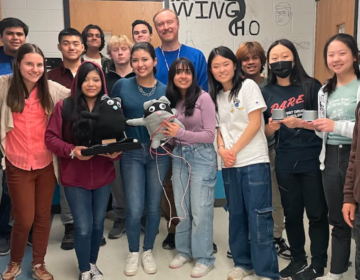Princeton Plasma Physics Lab offers ‘Science on Saturday’ lecture series
 Photo via ShutterStock " title="shutterstock_80815309" width="1" height="1"/>
Photo via ShutterStock " title="shutterstock_80815309" width="1" height="1"/>
The first lecture, by Alan Hirshfeld,focuses on "Starlight Detectives: How Astronomers, Inventors, and Eccentrics Discovered the Modern Universe."(Photo via ShutterStock
On Saturday morning, the Princeton Plasma Physics Laboratory will fill with a new type of energy: the public.
Science lovers, students, and the public are expected to pack the auditorium, which is enclosed in a federal U.S. Department of Energy complex on Princeton University’s Forrestal Campus.
They will be attending the launch of the 32nd year of the Ronald E. Hatcher “Science on Saturday” lecture series. The weekly program is designed to educate and engage those who might be curious about science — or who perhaps just want to have a bit of educational fun.
It’s science you can understand. And that’s precisely the goal of the series — to make science accessible for everyone, said Andrew Zwicker, PPPL’s director of science education.
“We try to make the lectures accessible, regardless of your scientific background,” he said.
Zwicker, who has led the education and outreach efforts at the PPPL for 12 years, also hosts every lecture in the series that runs into March.
The first lecture, “Starlight Detectives: How Astronomers, Inventors, and Eccentrics Discovered the Modern Universe,” will be given Alan Hirshfeld, a professor of astronomy at the University of Massachusetts.
Zwicker said the challenge isn’t simply to put together a program that attracts audiences — but, more fundamentally, to discover scientists who are gifted at sharing science with a curious public.
He cited the second lecture, “The Wild and Wacky World of Epigenetics,” as a great example. Shirley Tilghman, former president of Princeton University, will deliver that lecture Jan. 16.
“It’s clear that she understands her audience,” said Zwicker. “Her talk will be scientifically rigorous, but it will also be respectful of a variety of backgrounds in the audience.”
Starting with four lectures in February 1984, “Science on Saturday” has grown to a series of nine lectures that attracts between 250 and 350 members of the public every weekend.
“There’s a strong hunger in our community to understand the world around us,” Zwicker said.
Over the years, the series has attracted many loyal audience members.
“There have been people coming every single year for 32 years — they’ve never missed a year,” he said.
At a recent lecture, Zwicker recalled introducing “a couple who brought their daughter when she was 2 or 3 years old.” Now, she’s a professor of biology at a college in the Midwest.
“We’ve gone through an entire generation at this point,” he said.
Last year, the series was renamed in honor of Ronald E. Hatcher, a beloved engineer and educator who devoted nearly two decades to community outreach and the “Science on Saturday” series.
Hatcher understood how to connect with audiences on a human, emotional level, Zwicker said. He ignited the imaginations of the public, and he made cold Saturdays a little warmer.
“Ron understood that part of the attraction for the audience wasn’t just the science, but the scientist,” Zwicker said. “He’s really the person who grew this into what it is today.”
This year’s series includes lectures on astronomy, plasma physics, alternative energy, nuclear war, and more. The lectures will also be available online (live stream). You can also watch archived lectures.
WHYY is your source for fact-based, in-depth journalism and information. As a nonprofit organization, we rely on financial support from readers like you. Please give today.





